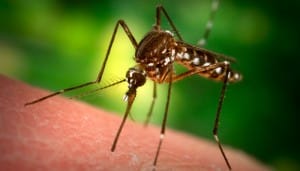Source(s): Excerpted from the Pest Management Newsletter
Dead birds may be a sign that West Nile virus is circulating between birds and the mosquitoes in an area. Over 130 species of birds are known to have been infected with West Nile virus, though not all infected birds will die. It’s important to remember that birds die from many other causes besides West Nile virus.

Report Dead Birds to Local Authorities
Dead birds may be a sign that West Nile virus is circulating between birds and the mosquitoes in an area. Over 130 species of birds are known to have been infected with West Nile virus, though not all infected birds will die. It’s important to remember that birds die from many other causes besides West Nile virus.
West Nile Virus and Dead Birds: Q and A
Q. What should I do if I find a dead bird?
A. Check with your local health department for instructions on reporting and disposing of a dead bird. If you need to pick up a dead bird, or local authorities tell you to simply dispose of it: Avoid bare-handed contact with any dead animals, and use gloves or an inverted plastic bag to place the bird carcass in a garbage bag and dispose of it with your routine trash.
Q. How can I report a sighting of dead bird(s) in my area?
A. State and local health departments start collecting reports of dead birds at different times in the year. Some wait until the weather becomes warm before initiating their surveillance (disease monitoring) program. For information about reporting dead birds in your specific area, please contact your state health department.
Q. Why do some areas stop collecting dead birds?
A. Some states and jurisdictions are no longer collecting dead birds because they have sufficiently established that the virus is in an area, and additional testing will not reveal any more information. Shifting resources away from testing of dead birds allows those resources to be devoted elsewhere in surveillance and control.
By reporting dead birds to state and local health departments, you can play an important role in monitoring West Nile virus. State and local agencies have different policies for collecting and testing birds. Please call your local health department for more information.:
Quick Facts: What can I do to reduce my risk of becoming infected with West Nile virus?
- Apply insect repellent sparingly to exposed skin. The more DEET a repellent contains the longer time it can protect you from mosquito bites. A higher percentage of DEET in a repellent does not mean that your protection is better—just that it will last longer. DEET concentrations higher than 50% do not increase the length of protection. Choose a repellent that provides protection for the amount of time that you will be outdoors. Repellents may irritate the eyes and mouth, so avoid applying repellent to the hands of children. Whenever you use an insecticide or insect repellent, be sure to read and follow the manufacturer’s DIRECTIONS FOR USE, as printed on the product.
- Spray clothing with repellents containing permethrin or DEET since mosquitoes may bite through thin clothing. Do not apply repellents containing permethrin directly to exposed skin. If you spray your clothing, there is no need to spray repellent containing DEET on the skin under your clothing.
- When possible, wear long-sleeved shirts and long pants whenever you are outdoors.
- Place mosquito netting over infant carriers when you are outdoors with infants.
- Consider staying indoors at dawn, dusk, and in the early evening, which are peak mosquito biting times.
- Install or repair window and door screens so that mosquitoes cannot get indoors.
- Help reduce the number of mosquitoes in areas outdoors where you work or play, by draining sources of standing water. In this way, you reduce the number of places mosquitoes can lay their eggs and breed.
- At least once or twice a week, empty water from flower pots, pet food and water dishes, birdbaths, swimming pool covers, buckets, barrels, and cans.
- Check for clogged rain gutters and clean them out.
- Remove discarded tires, and other items that could collect water.
- Be sure to check for containers or trash in places that may be hard to see, such as under bushes or under your home.
Note: Vitamin B and “ultrasonic” devices are NOT effective in preventing mosquito bites.
Center Publication Number: 95